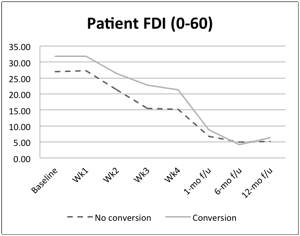Session Information
Session Type: ACR/ARHP Combined Abstract Session
Session Time: 4:30PM-6:00PM
Background/Purpose: Given the degree of compromise in
quality of life, there is a critical need to identify the natural history of
pain and disability in association with conversion symptoms. While there is increasing
recognition of comorbid conversion disorder in pediatric chronic pain, few studies investigate the
effect of interdisciplinary treatment on outcomes in children with chronic
musculoskeletal pain and conversion disorder. We hypothesized youth with
conversion disorder would have greater pain, disability, and anxiety at
baseline and throughout treatment, leading to worse function, pain, and
psychological outcomes.
Methods: This outpatient program provides 5-6 hours of daily
intensive PT and OT in addition to self-regulation, and behavioral health
intervention. 69 participants age 11-18 (58 female) with chronic
musculoskeletal pain completed Functional Disability Inventory (FDI), PROMIS
anxiety, depression, and peer relationships, PRCQ-catastrophizing,
CPAQ-A, and reported pain using a 100mm Visual Analog Scale (VAS 0-100) at
program start, end of each week, and at 1, 6, and 12-mos follow-up. Hierarchical linear modeling (HLM) software was used to
conduct time-series analyses.
Results: 19 participants (15 female) had conversion disorder. Patients
with conversion had greater physical disability upon program entry (P=.02). Functional differences decreased during the program,
with trends toward faster improvement among those with conversion (P=.089), and these differences resolved by follow-up. All
patients significantly improved function from baseline to program end (P<.001) and continue to improve following treatment (P=.002). Similar
patterns were found for peer relationships and pain acceptance. Patients with
conversion had similar pain severity (M=61.5) as those without conversion (M=58.4)
at baseline (P=.48) and throughout. Both groups demonstrated
significant decrease in pain through follow-up (P=.001). There were no differences between groups
in depression, anxiety, or catastrophizing.
Conclusion: Children
with chronic pain and comorbid conversion disorder have increased disability,
poorer peer relationships, and decreased pain acceptance compared to those
without conversion at baseline, though differences resolve post-treatment.
Patients with conversion have similar pain severity and no differences in
depression, anxiety, or catastrophizing to those without conversion. Both
groups demonstrate significant improvement in function, pain, and psychological
outcomes post-treatment. Prospective studies are warranted to determine best
practices for diagnosis and treatment of comorbid conversion symptoms in
children with chronic pain.
Figure: Patient Functional Disability Inventory (FDI)
demonstrates increased disability in patients with conversion at baseline (P=.02). Functional differences resolved by follow-up.
To cite this abstract in AMA style:
Hoffart C, Wallace D. Characteristics and Trajectories of Child Pain, Function, and Psychological Outcomes Associated with Conversion Disorder in Intensive Interdisciplinary Pediatric Pain Rehabilitation [abstract]. Arthritis Rheumatol. 2015; 67 (suppl 10). https://acrabstracts.org/abstract/characteristics-and-trajectories-of-child-pain-function-and-psychological-outcomes-associated-with-conversion-disorder-in-intensive-interdisciplinary-pediatric-pain-rehabilitation/. Accessed .« Back to 2015 ACR/ARHP Annual Meeting
ACR Meeting Abstracts - https://acrabstracts.org/abstract/characteristics-and-trajectories-of-child-pain-function-and-psychological-outcomes-associated-with-conversion-disorder-in-intensive-interdisciplinary-pediatric-pain-rehabilitation/

